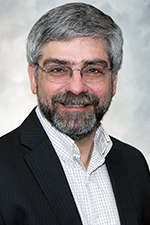2024 IEEE Marie-Sklodowska Curie Technical Field Award
Award Recipient — Richard E. Carson

This award is to be presented to Richard E. Carson, Ph.D., an IEEE Fellow, at the 2024 NSS/MIC/RTSD conference in Tampa, Florida, USA.
The IEEE Marie-Sklodowska Curie Award is an IEEE Technical Field Award sponsored by the IEEE Nuclear and Plasma Sciences Society. The award recognizes outstanding contributions to the field of nuclear and plasma sciences and engineering. Under consideration in selecting the recipient are the importance of individual scientific contribution, importance of scientific contributions made by teams led by the candidate, seminal nature of the contribution, innovation/originality, societal benefit, and impact on the profession.
Richard Carson began his academic life with an interest in applying novel mathematical techniques to solve biological and clinical questions. He has been fortunate to be an active researcher in Positron Emission Tomography (PET) for over 45 years. Dr. Carson began as a graduate student in Biomathematics at UCLA, working with his mentors Sung-Cheng (Henry) Huang, Edward Hoffman, and Michael Phelps, shortly after the development of the first PET systems. Dr. Carson developed novel algorithms for tracer kinetic analysis, focusing then on cerebral blood flow measurements with 15O-water. In addition, he and Kenneth Lange published a seminal paper on the EM algorithm for image reconstruction in 1984 that has been cited over 2500 times (per Google Scholar). This paper provided the sound statistical framework for the reconstruction algorithm present in all commercial PET systems today. In subsequent years, Dr. Carson contributed novel algorithms including direct parametric reconstruction, region-of-interest-based reconstruction, list-mode and Bayesian algorithms, and list-mode reconstruction with event-by-event motion correction.
After receiving his Ph.D. from UCLA in 1983, Dr. Carson joined the PET program in the National Institutes of Health. During this period. Dr. Carson made substantial contributions to PET imaging in tracer kinetic modeling, where he is one of the true world leaders. His primary specific contributions include techniques for bolus-plus-continuous infusion of tracer, improved reference tissue kinetic modeling, and novel graphical analysis methods. In another significant area, Dr. Carson developed novel quantitative methodology to assay neurotransmitter release that has been used in multiple systems and species. Working with Dr. Robert Innis and a world-wide team of kinetic modelers, a consensus nomenclature paper for PET neuroreceptor modeling was produced that set the standard for brain tracer studies. Dr. Carson continued his kinetic modeling work when he moved to Yale in 2005 and has now produced kinetic modeling publications involving over 50 radiopharmaceuticals, mostly for brain applications.
In the last decade, Dr. Carson in collaboration with Yiyun (Henry) Huang, has led the development of synaptic imaging with PET. This novel work provides a unique imaging modality for clinical and preclinical imaging that is already having major impact on assessing the etiology, progression, and treatment of a wide range of neuropsychiatric disorders including Alzheimer’s disease and Parkinson’s disease. The applications of this work have been presented in over 150 publications to date and synaptic density tracers are now in use in imaging centers all over the world.
More recently, Dr. Carson led a team from Yale, UC Davis, and United Imaging to produce an ultra-high-performance brain PET/CT system, the NeuroEXPLORER (NX). The exceptional human images acquired with the NX system are pushing the state-of-the-art in terms of spatial resolution and sensitivity.
Ongoing scientific achievement depends on each generation passing their knowledge forward. Over a long and satisfying career, Dr. Carson has been extremely fortunate to have an exceptional group of mentors and colleagues, covering a wide range of basic and clinical science specialties. Now, he greatly enjoys being a mentor for undergraduates, graduate students, post-doctoral fellows, and junior faculty, to help them extend the frontiers of medical imaging science.
Citation: For contributions to image reconstruction and tracer kinetic analysis in Positron Emission Tomography.
Richard Carson can be reached by E-mail at [email protected].